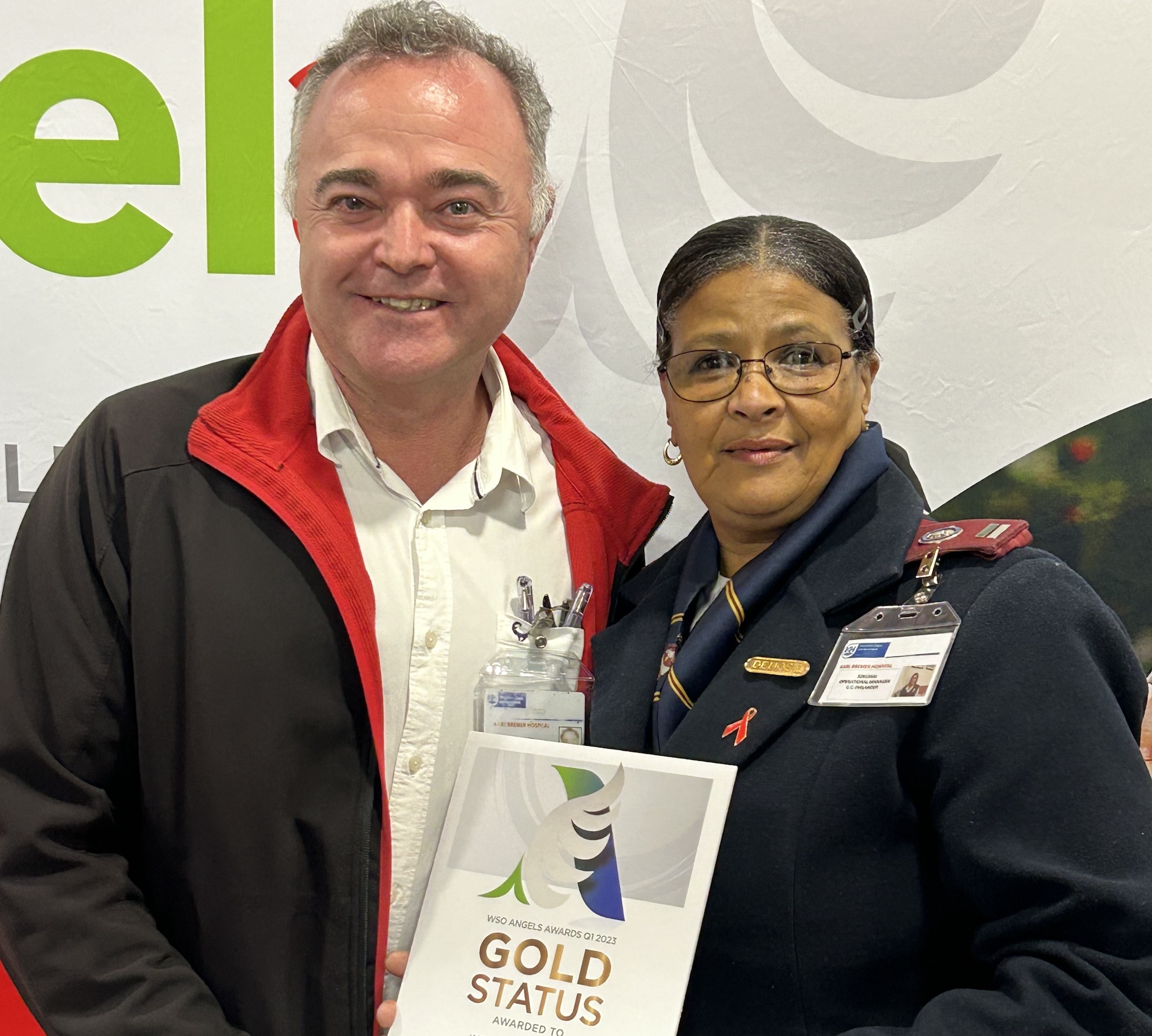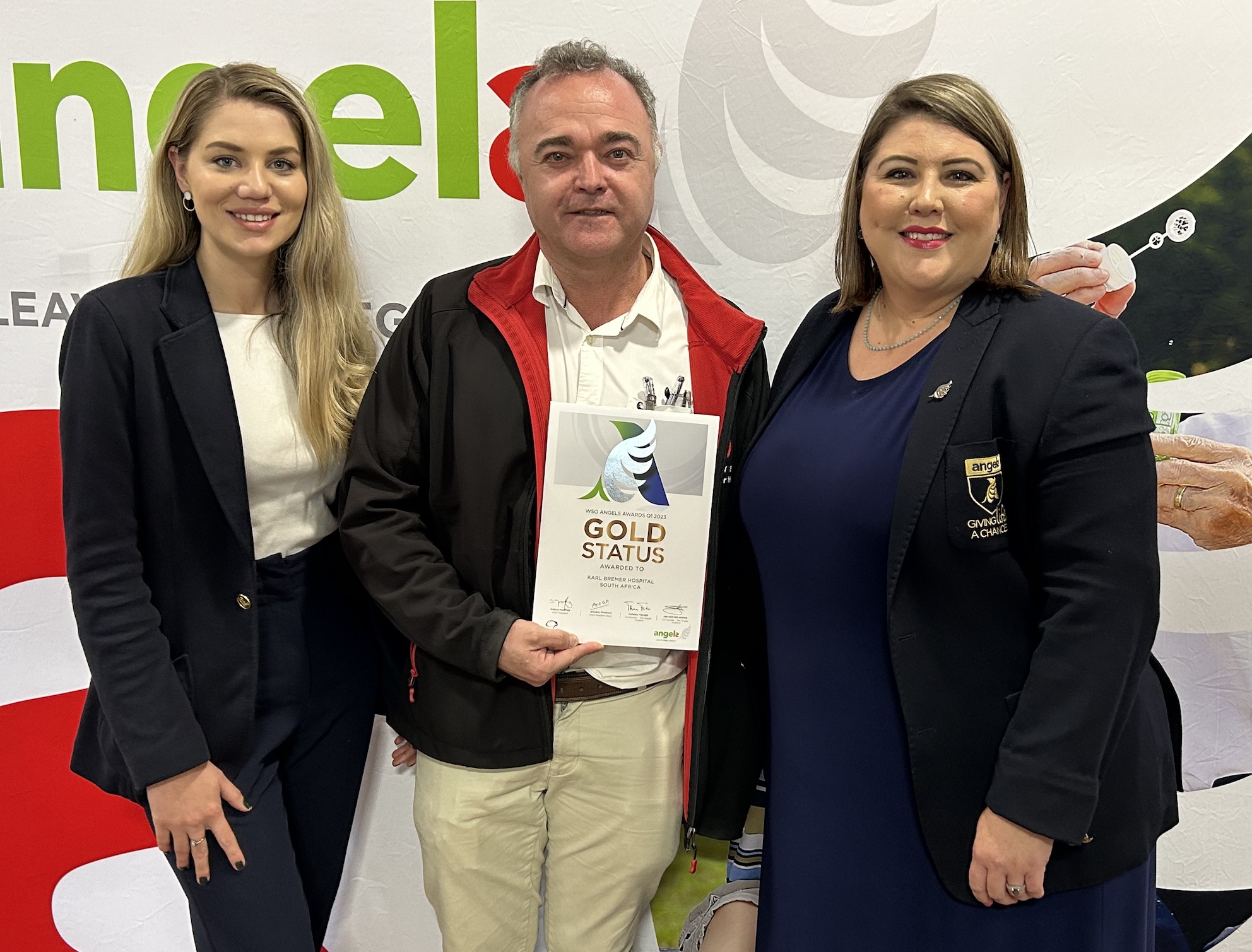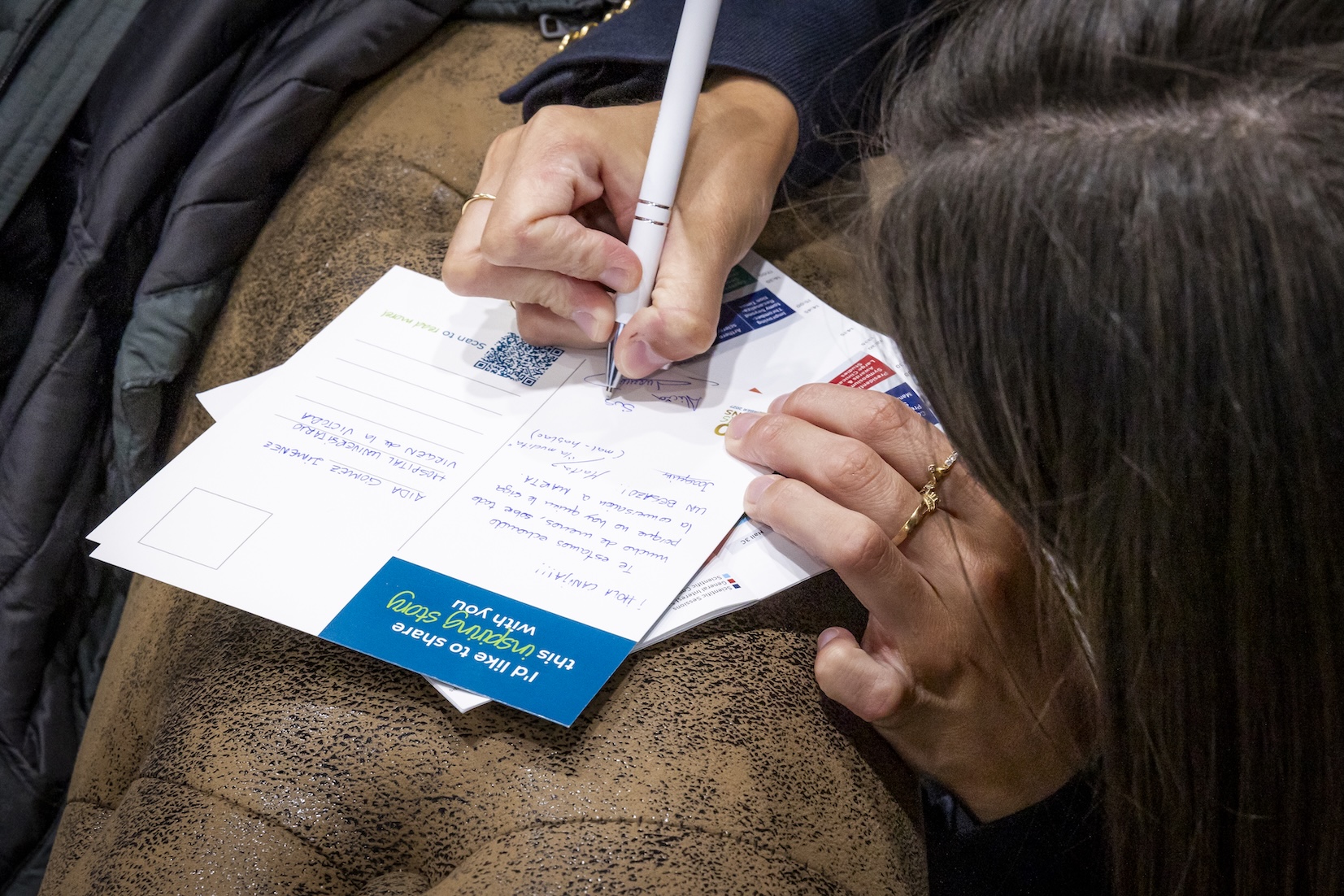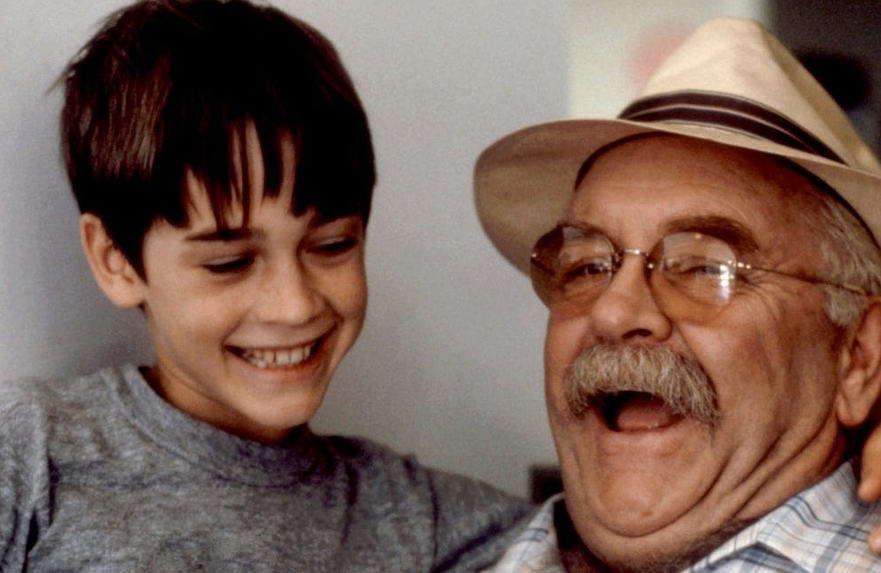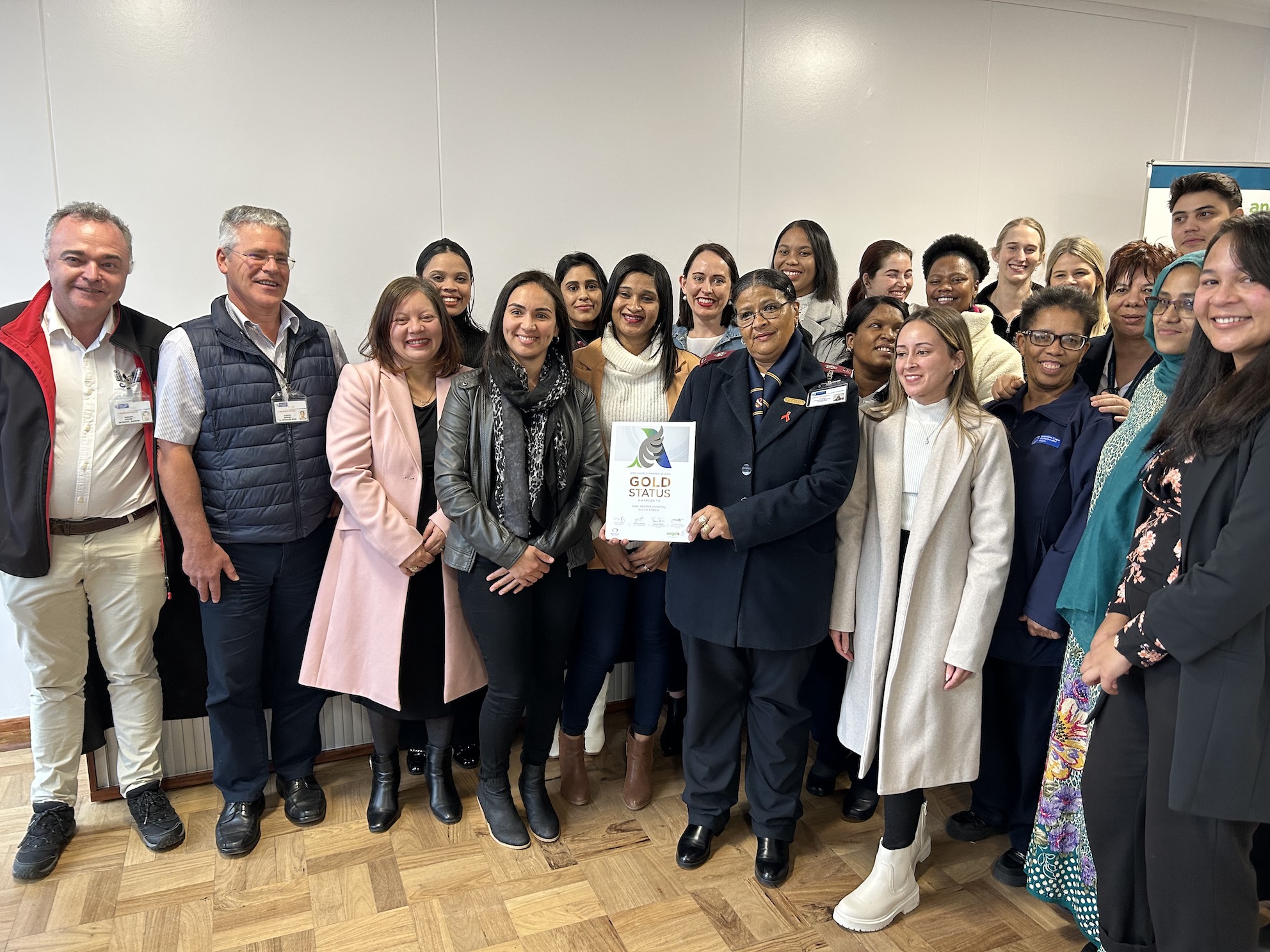
Cuando llegó el correo electrónico a las 13:00 54 del miércoles 3 de mayo, el Dr. De Vries Basson estaba a punto de salir de su oficina para asistir a una reunión. No tuvo que abrirlo porque todo el gist estaba incluido en el tema:Enhorabuena al hospital Karl Bremer – WSO Angels GOLD AWARD Q1.
El Dr. Basson es el director de Medicina Interna en Karl Bremer, un hospital de distrito a unos 23 km del noreste de Ciudad del Cabo. Se trata de un hospital financiado por el estado cuyas diversas poblaciones de pacientes van desde personas que han abandonado la atención sanitaria privada después de perder su seguro hasta las más pobres. Su tasa de ocupación de camas supera el 120 por ciento en la mayoría de los días de la semana, y hasta que el hospital se desconectó a principios de 2023, la infraestructura eléctrica inestable de Sudáfrica se sumó a sus desafíos a medida que se cancelaban las cirugías y el escáner TC se desviaba de sus límites durante varias horas de interrupciones de energía planificadas al día.
El ictus en Sudáfrica se cobra una media de 110 vidas al día y deja a 90 supervivientes discapacitados. En el Cabo Occidental, donde se encuentra el hospital del Dr. Basson, entre el 35 y el 40 por ciento de estos pacientes son menores de 40 años. Lo que hay detrás de este escalonado número es una tormenta perfecta de obesidad, inactividad, hipertensión y diabetes no controladas, abuso de sustancias, especialmente cocaína, anfetaminas y VIH.
La comunidad tiene un conocimiento limitado de los síntomas del ictus, y a menudo adopta un enfoque de esperar y ver con consecuencias desastrosas: el tiempo medio de inicio en la puerta es de 1044 minutos o más de 17 horas.
Sin embargo, una vez dentro de la puerta, se les da la bienvenida a manos seguras de un equipo cohesivo de ictus, que incluye fisioterapeuta, terapeuta ocupacional, logopeda y trabajador social, que luchará por obtener el mejor resultado posible en cada paso del camino. Este equipo se reunirá al mediodía todos los martes para hablar del progreso y la transición de la atención de cada paciente. A pesar de su dedicación y creatividad, una escasez crónica de instalaciones de rehabilitación y reducción de dosis hace inevitable que algunos pacientes, especialmente aquellos que vuelven a acuerdos informales, tengan dificultades para acceder a un apoyo adecuado en sus comunidades. Estos pacientes volverán en cuestión de semanas, más enfermos que antes.
Es un trabajo difícil, pero hay que hacerlo, Lou Rawls cantó en 1981. El Dr. Basson ocupa su puesto actual desde 2005, pero cuando llegó el correo electrónico el miércoles 3 de mayo, fue la única vez que lloró.
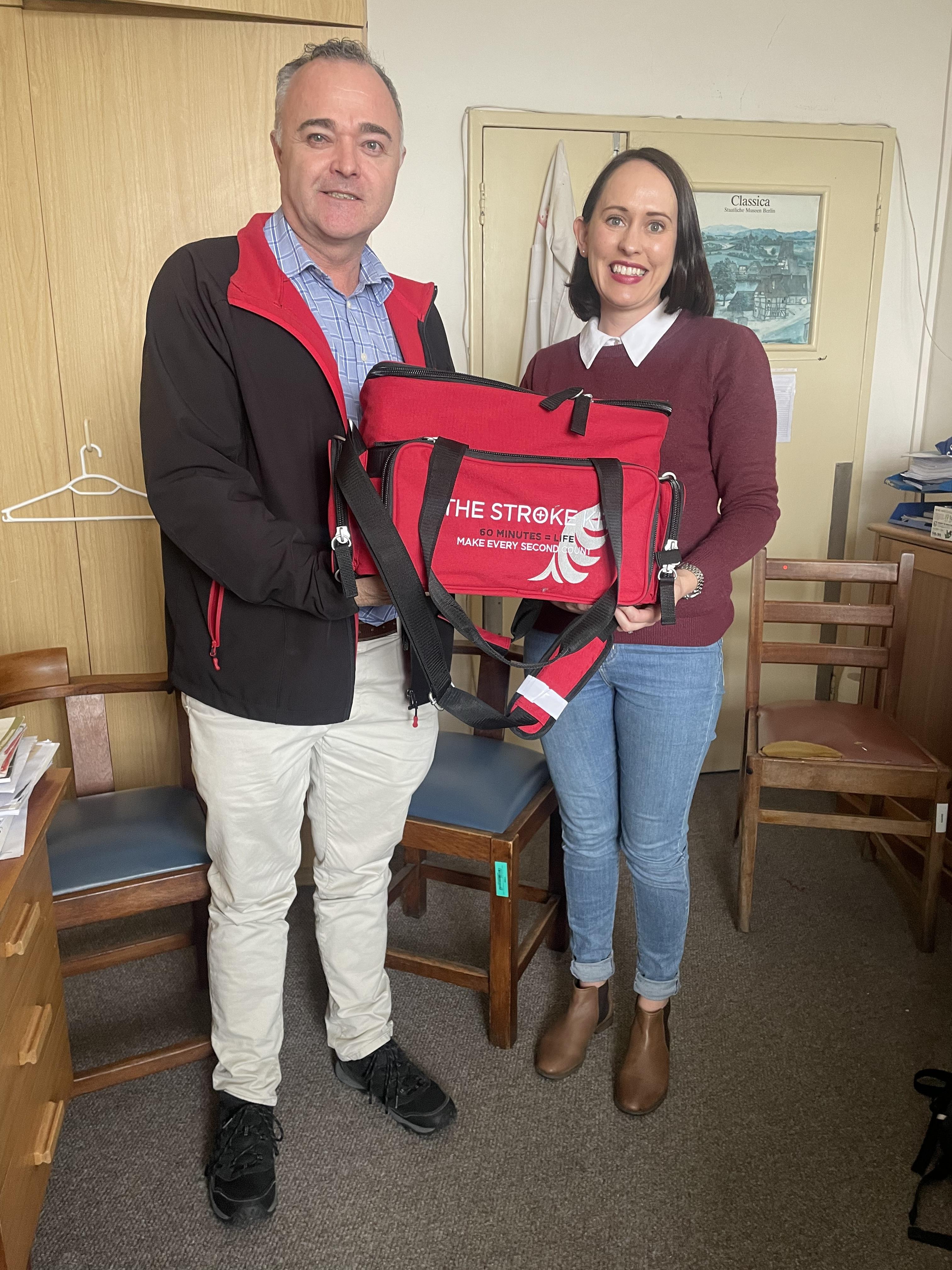
Crecimiento en una pequeña ciudad rodeada de granjas de trigo, Annelie Bruwer nunca podría haber predicho que el amor por las personas y el lenguaje la llevaría a formar parte de un galardonado equipo de ictus en uno de los hospitales más antiguos del Cabo Occidental.
Se graduó en la Universidad de Stellenbosch y trabajó en el departamento de salud provincial de la provincia de la sequía de Cape del Norte antes de unirse al proyecto Child Speech and Hearing Project que introdujo la logopedia en la atención primaria en 2014.
Cuando fue ingresada en el Karl Bremer Hospital en 2018, no había habido un terapeuta del habla en este hospital en dos décadas. En el plazo de un año desde que pasó a formar parte del equipo, la aspiración en los pacientes con ictus había descendido en un 158 %.
Una complicación frecuente durante la recuperación del ictus, la aspiración se produce cuando se inhalan alimentos o líquidos en los pulmones como resultado de dificultades para tragar (disfagia) causadas por el ictus.
La disfagia afecta hasta al 78 por ciento de todos los pacientes con ictus. La neumonía por aspiración se produce en el 10 % de los pacientes con ictus con disfagia y se asocia a un número significativo de muertes y mayores tasas de dependencia.
Annelie dice: “Mantener a la paciente segura mientras está en el hospital es su primer objetivo. Se realizarán intervenciones del habla y el lenguaje, pero el primer paso es una evaluación de la disfagia en las primeras 24 horas que puede ir seguida de intervenciones para prevenir la aspiración, como el posicionamiento, la dieta modificada y los ejercicios para mejorar la eficiencia de la deglución. Las necesidades de alimentación del paciente darán forma en última instancia a su plan de alta y al arco de curvas de recuperación hacia el alta casi desde el momento del ingreso.
No tenía ni idea de lo central que era el papel de los logopedas en los resultados de los pacientes con ictus, afirma el Dr. Basson, que ha pasado de ser escéptico a convertirse en defensor. La formación de médicos no los expone al ámbito de la patología del habla-lenguaje ni al impacto que puede tener en, entre otras cosas, el tiempo en el hospital, lo que impide la aspiración en más del 50 %.
Trabajar con pacientes con ictus puede levantar el corazón o romperlo, dice Annelie. Es creativo e intenso, y puede ser inspirador ver el progreso realizado por los pacientes y sus familias. Pero puede ser igualmente difícil dejar de hacerlo cuando un paciente vuelve a una vida de desafíos inimaginables que ni ellos ni sus familias tienen que comprender.
La gracia con la que algunas familias se adentran en este mundo desconocido es algo que vio al principio de su carrera profesional cuando un ictus devastador dejó a un devotado director escolar que sufría afasia expresiva: la capacidad de comprender el habla, pero no de utilizarla. Incapaz de volver a la escuela a la que había dedicado su vida, siguió encontrando otras formas de contribuir a su pequeña comunidad.
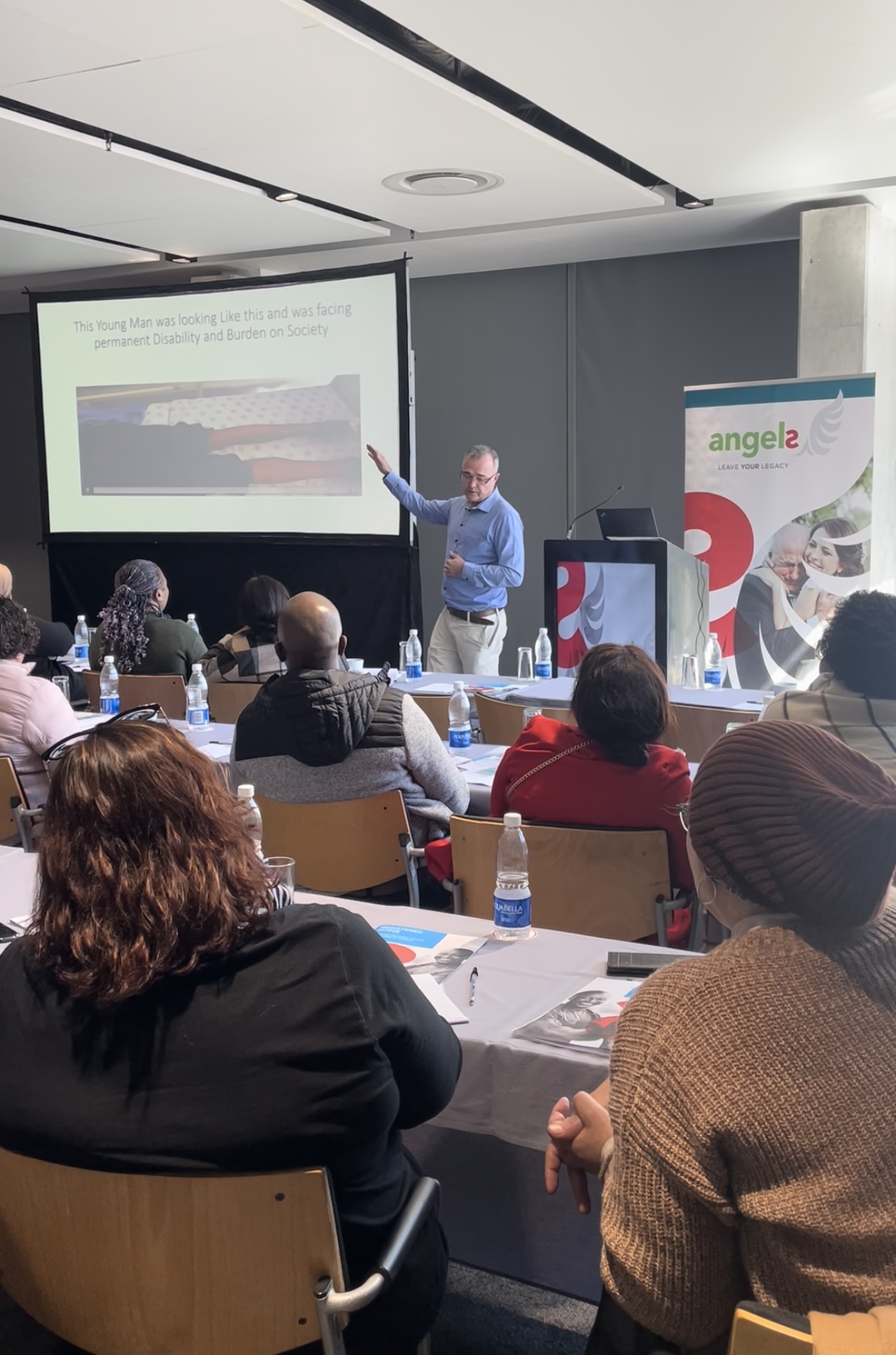
ALGUNOS pacientes que no puede olvidarse. La cocaína y la anfetamina addicó a 31 años de edad, cuya familia le consiguió ir al hospital a tiempo y que salió del hospital siete días después para convertirse en un activista de ictus sin drogas. O la madre soltera con una puntuación NIHSS de 18 que, habiendo tenido que ser trasladada a un hospital privado para una TAC, se fue a casa a sus dos hijos una semana después del tratamiento con trombólisis.
“Cuando vea cómo se recupera un paciente después del tratamiento, quiere que el siguiente paciente lo reciba también”, dice el Dr. Basson.
Karl Bremer solo se ha sometido a un escáner TC desde 2015 y los pacientes que lleguen fuera del horario laboral todavía deben someterse a exploraciones en un hospital especializado a 5 km de distancia, un problema de recursos para el que la telemedicina puede ofrecer una solución.
Un estudiante de ictus en su capacidad de investigador principal en un centro privado de ensayos clínicos ubicado en el hospital hasta finales de 2022, el Dr. Basson inició la formación sobre el ictus con el apoyo de Angels en 2017. El primer paciente fue tratado con trombólisis en 2018.
Aquí, como en cualquier otro lugar, la pandemia provoca un descenso de los pacientes que presentan ictus. Entrevistado por medios locales durante la tercera y más debilitante ola de infecciones por la Covid-19 en Sudáfrica, el Dr. Basson reveló lo que le mantuvo a través de horas aparentemente infinitas en cuidados intensivos: “Hay una cita del [coaching americano de fútbol] Vince Lombardi que me mantiene fuerte: “Creo firmemente que la hora más alta de cualquier hombre, el mayor cumplimiento de todo lo que estima, es el momento en el que ha sacado el corazón adelante por una buena causa y está agotado en el campo de la batalla, victoria”.
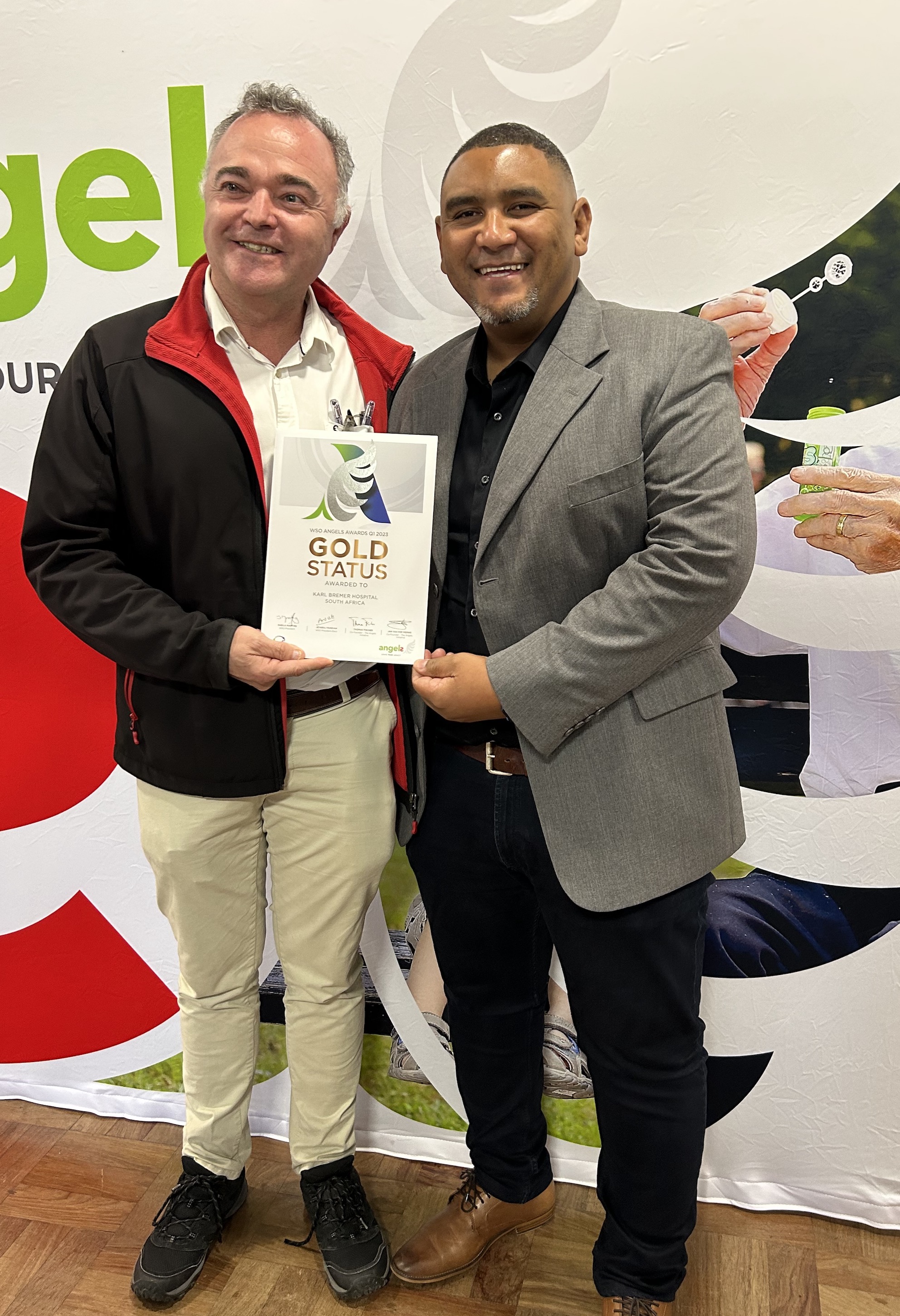
Una vez que la pandemia remitió, un aumento de los ictus testificó la desatención del tratamiento de la enfermedad crónica durante el confinamiento. Los niveles de glucosa en sangre aumentaron, la hipertensión estaba mal controlada. Estos y otros factores de riesgo modificables o evitables del ictus son los que impulsan una campaña individual para educar a la comunidad sobre el ictus. El Dr. Basson, invitado regular a las emisoras de radio locales, nunca rechaza la oportunidad de hablar con las comunidades sobre la prevención del ictus, los síntomas del ictus y la importancia de llevar al paciente al hospital lo antes posible.
También se siente preocupado por la carga del ictus y la discapacidad en una economía empedernida y, especialmente en el Cabo Occidental, el impacto desproporcionado en los adultos jóvenes se convirtió en futuros líderes.
Es optimista en cuanto a que la campaña Héroes de FAST (un proyecto de concienciación sobre el ictus que canaliza la educación sobre el ictus a través de niños de educación primaria) no solo movilizará a los jóvenes para que enseñen a sus padres y a sus abuelos sobre las enfermedades crónicas del estilo de vida, sino también les animará a adoptar estilos de vida más saludables.
El objetivo: una generación menos agobiada por el ictus. El dividendo: menos familias y vidas se ven interrumpidas por una catástrofe en gran medida evitable.
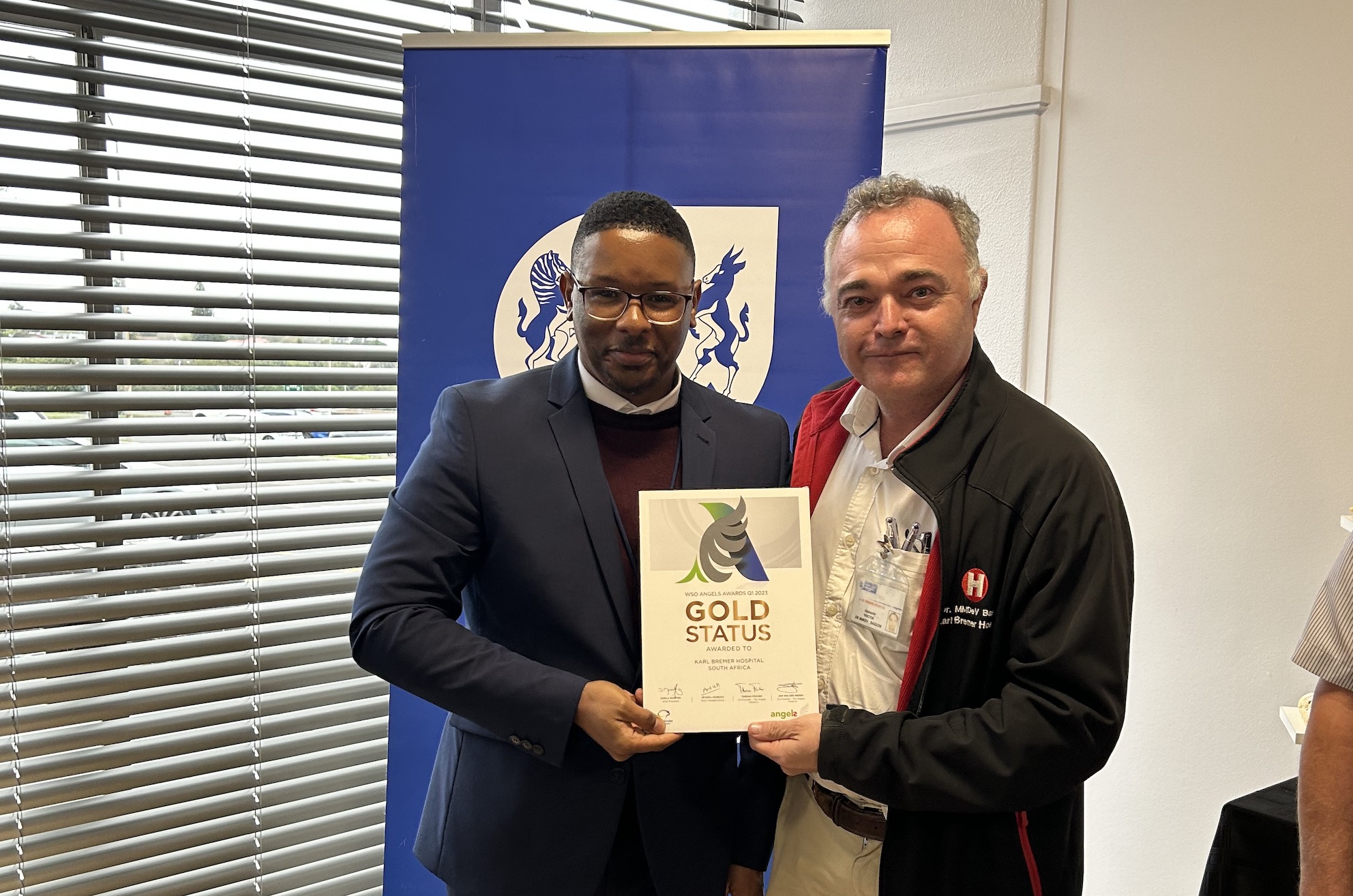
KARL BREMER se encuentra entre un número pequeño pero creciente de hospitales de Sudáfrica que están recogiendo datos en el registro internacional de mejora de la calidad de la atención del ictus RES-Q y ven las recompensas. Hasta la fecha, ocho hospitales sudafricanos se han cualificado para los premios Angels de la WSO. Karl Bremer es el segundo segundo hospital público (después del Hospital Académico Steve Biko de la provincia de Gauteng) en lograr esta distinción y el único hospital del Cabo Occidental.
El Dr. Basson cree firmemente en el cambio basado en los datos. Dice: “RES-Q captura todos los indicadores importantes; los informes trimestrales muestran en qué dirección se está moviendo y le proporcionan objetivos realistas. Le proporciona todo el oro que puede utilizar para mejorar los cuidados del ictus, motivar para obtener mejores recursos y defender a los pacientes. Y es fácil de usar, por lo que no hace falta un doctorado para capturar datos, informar y utilizarlos para beneficiar a sus pacientes”.
Lo que se necesita es tiempo, una de las razones más comunes citadas por los hospitales que no participan en el control de calidad. El Dr. Basson afirma que el entusiasmo y la dedicación de su equipo le motivan para incluir sus horas libres en la captura de datos.
La energía positiva fluye en ambas direcciones, dice Annelie Bruwer, que atribuye al Dr. Basson la unidad, el impulso y el enfoque compartido que caracterizan su entorno de trabajo. “Es uno de los especialistas más humildes que muchos de nosotros hemos encontrado, un líder amable y reflexivo que permite que se escuche a todos”.
Su liderazgo funcional influye en la cultura hospitalaria de Karl Bremer y comprueba la arrogancia incipiente de los médicos jóvenes que acaban de formar parte de la facultad de medicina, para los que la coexistencia de la humildad y el rendimiento galardonado pueden ser formativos. Incluso puede convertirlos en la creencia de Vincent Lombardi de que la mejor hora del hombre llega cuando ha sacado el corazón adelante por una buena causa.
ACTUALIZAR: En Q3 de 2023, el equipo del Dr. Basson tenía aún más motivos para celebrar cuando se anunció que Karl Bremer había ganado un premio Diamond.
